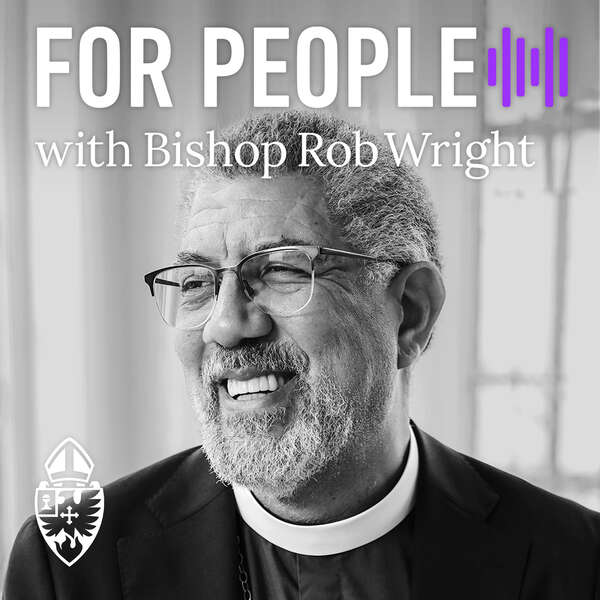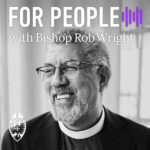FP 7.15.22 (Summer Shorts Question – 2)
Easton: This is For People with Bishop Rob Wright.
Melissa: Welcome to For People with Bishop Rob Wright. I’m Melissa Rau and this is Summer Shorts. This summer, we’ve asked our listeners to share questions they have for Bishop. This is Question 2 on our 5 part series.
Bishop, this is a question from Christian from Georgia. And he asked, how can we work for lessening income and inequality and pushing for universal healthcare as a church?
Rob: Great question. Let me just tell you where I start. This will be sort of infinitely, you know, an adequate answer. But let me tell you where I start there. I always get a little bit– My antennas go up when people say what can we do as a church? And you know, the sort of the teacher in me wants to remind us that, are we talking about an organization or as individuals, right? Because we are the church, you and I, individuals. And anytime we’ve ever made any progress in this country, it’s because individuals who understand themselves as church, that is baptized, Holy Spirit guided folks, have decided to beat the drum about something, and continue, and persevere against the odds to make the changes necessary to sort of close the gap between, you know, as I like to say, between heaven and hell.
So, the first thing I want to ask is, is that, let’s not sit around and wonder what the organization is doing. Let us as individuals, take this passion that burns in us as a calling and get to work. That is true for any number of organizations that have been following, Habitat for Humanity, the Highlander School, the work that led to the Civil Rights Movement, the Children’s Defense Fund. It’s always been about what I like to say as, a few pissed off Christians, who have decided to change the world. And, you know, against all odds. So, I want to say that number one.
So, if this is burning on someone’s heart– Christian, if this is burning on your heart, perhaps the Holy Spirit is trying to tell you something about how you should spend your life, right? That’s number one.
Number two, if we are talking about organization, because there is an organizational part about this. I think it is, how do we get the message to more people in the organization about the perils of radical economic inequity, right? Because it is perilous. And all the research says to us that this country is becoming, you know, mostly have nots with a, you know, few of us, being haves. And that is the way that things are going. And the disparity is just jarring.
And in Atlanta, sadly enough, Georgia is actually, you know, is leading the nation in a lot of these causes, housing, income, etc. And so, we’ve got to get some information out. But again, it all boils down to, you know, who’s got the fire, right? We can play the should game. We can say, you know, all these congregations should this and should that and should the other thing.
Here’s what we learned from Bryan Stevenson, it’s all about proximity. When people meet, authentic care and concern in you, or in I about something, that we want to give our life too, that is when the needle moves and that is when things change. But otherwise, this is just a issue on a mountain of issues that people have some sense of, but it’s never really come close. So, Bryan Stevenson asked us to sort of, number one, get really close to the issue, right? And then, number two, take that closeness and to be close to other people. And so, we need somebody to beat the drum on this.
But yes, it is the church’s business because it is about neighborliness. So, your question is fantastic in that regard. You’re asking us about what is the quality of our neighborliness? Do we actually manifest real world care and concern for people who are without?
Melissa: Yeah, there was a follow up question, right? Because Christian also mentioned universal healthcare. And I’m wondering, is that the answer?
Rob: Well, I mean, again, this is where some will agree and someone won’t agree with me. I actually believe healthcare is a human right, right? And so, you know, that’s a real grievous disparity for me. I believe that the floor height of this country should be at a certain level, where all of her citizens enjoy certain benefits and healthcare is one. Why should we, a great country like this country, why should we be peer with other countries less developed than us in terms of not providing these benefits? Or to say it another way, why should countries who are smaller than us and who don’t proclaim themselves to be great, they’re ahead of us in leave taking for women with children. They are ahead of us in universal healthcare. They’re ahead of us in so many categories. And so, I think that it’s where we have to definitely get to. And again, that starts all with us joining in, beating the drum about these things. And you know, what we have to say about the Christian part of this is, is that, unless we’re ready to give our life for something, you know, then we’re just talking. You know, Miroslav Volf, said, you know, there’s something hypocritical about praying for something that you personally are not actively working on, right? And so, are we trying to outsource some stuff to God and other people, or do we want to take up our cross and walk?
Melissa: Well, and so, Bishop, you talked about being, you know, a few Christians being on fire and doing great. And yet, our Episcopal Church has an Office of Government Relations and a number of other ways for people to get involved and advocate for the things that are on their heart. Do you know of other churchwide organizations that people might be able to plug into?
Rob: Yeah, no, I don’t. I mean, that’s one of the best ones. Because that office sort of lives at the intersection of faith and public policy. But there are other organizations that we can familiarize ourselves with too. And you know, I would also say to anybody, we don’t have to look for “Christian organizations”, right? I think we can get alongside of all kinds of people in service to this great cause, right? And so, if the cause is the purpose, and you happen to come at it as a Christian and it’s part of your vocation as a Christian, then hallelujah and twice on Sunday, right? But we don’t have to be looking specifically for Christian organization. What we’re looking for is to change the country for the better. And so, we can find all kinds of partners if that is our aim.
Melissa: Great. Christian, thank you for your question. And Bishop, thank you for your wisdom.
And thank you listeners for listening to For People and Summer Shorts. You can follow us on Instagram and Facebook at Bishop Rob Wright. And check us out next week for Question #3.



